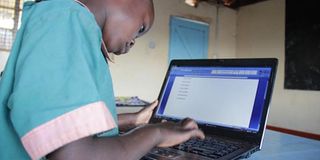Thousands of jobs in the pipeline as laptops plan starts

Diana Wanjiku of Thunguma Primary School in Nyeri practises typing. FILE PHOTO | JOSEPH KANYI |
What you need to know:
- The firm has expertise from delivery of laptops to schools in similar projects in Brazil, Argentina, Uruguay and Rwanda. JKUAT expressed confidence in its partners saying that Positivo BGH has technology that can design gadgets that withstand rough handling.
- “About 3,000 people will directly benefit from this job. We will also have casual workers to deliver, load and offload the consignments at the 21 counties.”
- ICT Cabinet Secretary Joe Mucheru told Smart Company that class one pupils will be given laptops every year, because the project is long-term.
The shortlisting of two public universities to deliver the Sh17 billion school laptop project has been warmly received with expectation that it would generate hundreds of jobs.
The participation of the Consortia involving Moi University and Jomo Kenyatta University of Agriculture and Technology (JKUAT) to supply the laptops means new local jobs.
Mr Suleiman Oketch, director of Industrial and Technology Park at JKUAT said at least 3,000 people in the 21 counties (marked for delivery by university) will directly benefit through employment.
“Our local assembly plant has the capacity to produce 750,000 devices per year if we work on three shifts,” said Mr Oketch.
“About 3,000 people will directly benefit from this job. We will also have casual workers to deliver, load and offload the consignments at the 21 counties.”
The two winning suppliers will first demonstrate their abilities next week by connecting 150 schools. They will in June deliver the first batch of 600,000 devices. The second batch of devices will be delivered in June 2017.
ICT Cabinet Secretary Joe Mucheru told Smart Company that class one pupils will be given laptops every year, because the project is long-term.
“Every year the government plans to give laptops to class one pupils. So this is a recurrent project, it keeps going on and on but the Sh17 billion allocation could change depending on manufacturing costs going forward,” said Mr Mucheru last week.
The government will set unique colours, logo and branding to make the laptops stand out from others in the market. Tracking mechanisms will also help secure the laptops in case they are stolen.
The Request For Proposal (RFP) document issued out to suppliers states that; teachers will have 14 inch laptops, learners’ 10 inch tablets, while special need pupils will have 12 inch laptops with brail key boards, head phones and an embosser.
ROUGH HANDLING
Winners are expected to oversee the supply of laptops to 1.2 million pupils in 22,000 public primary schools by close of every year beginning this year. The devices are specific to learners, teachers and special needs pupils.
JKUAT has partnered with Positivo BGH, a joint venture between Positivo Informática Brazil and Argentina BGH.
The firm has expertise from delivery of laptops to schools in similar projects in Brazil, Argentina, Uruguay and Rwanda. JKUAT expressed confidence in its partners saying that Positivo BGH has technology that can design gadgets that withstand rough handling.
While Positivo will manufacture and import spare parts used for the laptops and tablets, JKUAT will assemble them at its plant, which is already working and has in the past assembled Kenya’s first laptop called ‘Taifa’.
“We have the full skilled labour to run the factory and therefore capability to handle those devices. Positivo BGH will supply the kits and JKUAT will assemble them,” said Mr Oketch.
The consortium of Moi University and Portuguese IT Company JP SA Couto won the tender to oversee the supply, installation and commissioning of the Digital Learning Solution for schools in 26 counties.
The official in charge of Diplomatic Mission of Portugal in Nairobi Mr Francisco Xavier said that JP Couto has vast experience in projects similar to Digital Literacy Project.
“They deliver laptops and other IT solutions to school systems, as they have done it in other countries, including Portugal, the country I represent in Kenya,” he said.
“This partnership of JP Sá Couto and the Moi University is a model we very much encourage and support as we believe it can be mutually beneficial to both countries and their respective institutions.”





